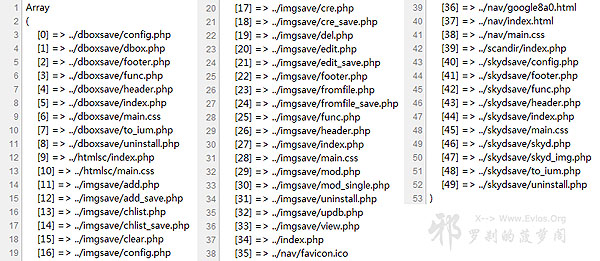我們要使用的函數有 Scandir,它的作用是列出指定路徑中的文件和目錄,就像 Dir 一樣。

> 與更強力的 Glob() 函數,作用是以數組的形式返回與指定模式相匹配的文件名或目錄。
> 友情提醒,千萬別像小邪那樣在電腦前面呆太長時間,否則就會像小邪一樣得見鬼的高血糖。
一. 遍歷單層文件夾:
> 在掃描單層文件夾的問題是,兩個函數的結果雖有不同,不過表現是相差不大的。
> Scandir 函數會提供額外兩行,分別是 “.” 和 “..” ,而 Glob 則是沒有的。
復制代碼 代碼如下:
function get_dir_scandir(){
$tree = array();
foreach(scandir('./') as $single){
echo $single."<br/>\r\n";
}
}
get_dir_scandir();
function get_dir_glob(){
$tree = array();
foreach(glob('./*') as $single){
echo $single."<br/>\r\n";
}
}
get_dir_glob();
二. 遞歸遍歷文件樹:
> 在遞歸掃描文件夾樹的問題上,還是 Glob 函數的表現好一點,很准確的說。
> Scandir 函數會莫名其妙掃描兩次 ../ 處的文件,也就是說如果小邪有倆文件。
> ../b.php 和 ../a.php,結果就會在掃描報告上面出現兩次,很是奇怪。
復制代碼 代碼如下:
//Update at 2010.07.25 - 以下代碼作廢
$path = '..';
function get_filetree_scandir($path){
$tree = array();
foreach(scandir($path) as $single){
if(is_dir('../'.$single)){
$tree = array_merge($tree,get_filetree($single));
}
else{
$tree[] = '../'.$single;
}
}
return $tree;
}
print_r(get_filetree_scandir($path));
//Update at 2010.07.25 - 以下為新代碼
$path = './';
function get_filetree_scandir($path){
$result = array();
$temp = array();
if (!is_dir($path)||!is_readable($path)) return null; //檢測目錄有效性
$allfiles = scandir($path); //獲取目錄下所有文件與文件夾
foreach ($allfiles as $filename) { //遍歷一遍目錄下的文件與文件夾
if (in_array($filename,array('.','..'))) continue; //無視 . 與 ..
$fullname = $path.'/'.$filename; //得到完整文件路徑
if (is_dir($fullname)) { //是目錄的話繼續遞歸
$result[$filename] = get_filetree_scandir($fullname); //遞歸開始
}
else {
$temp[] = $filename; //如果是文件,就存入數組
}
}
foreach ($temp as $tmp) { //把臨時數組的內容存入保存結果的數組
$result[] = $tmp; //這樣可以讓文件夾排前面,文件在後面
}
return $result;
}
print_r(get_filetree_scandir($path));
> Glob 函數掃描灰常准確,並且會自動按照字母排好順序,貌似是最佳方案。
復制代碼 代碼如下:
$path = '..';
function get_filetree($path){
$tree = array();
foreach(glob($path.'/*') as $single){
if(is_dir($single)){
$tree = array_merge($tree,get_filetree($single));
}
else{
$tree[] = $single;
}
}
return $tree;
}
print_r(get_filetree($path));